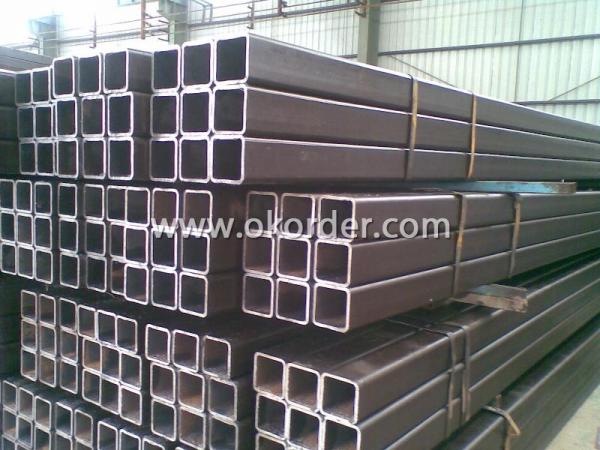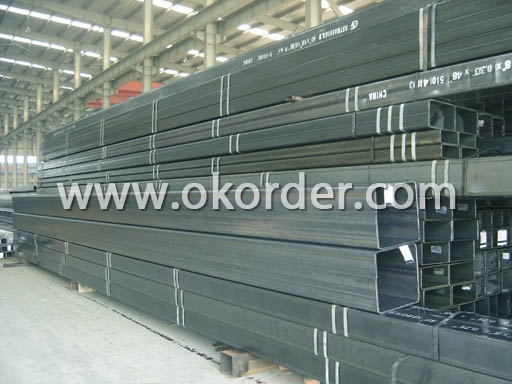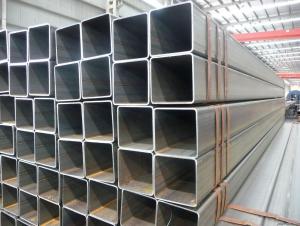Carbon ERW Welded Pipes-Square Tube And Pipe For Furniture ASTM A53 Hollow Section
- Loading Port:
- China Main Port
- Payment Terms:
- TT or L/C
- Min Order Qty:
- 50MT m.t.
- Supply Capability:
- based on order m.t./month
OKorder Service Pledge
OKorder Financial Service
You Might Also Like
1. Specification of ERW Welded Pipes-Square Tube and Pipe for Furniture ASTM A53 Hollow Section
1) Application: Greenhouse pipes, scaffolding pipes, transportation the ocean oil and gas, mechanical tube of ocean platform, power station, chemical industry and building, construction foundation piles, steel structure building, for low-pressur fluid service, steel structure bridges etc.
2) Standard: ASTM A53, BS1387, GB/T9711, GB/T390133) Steel Grade: Q195/Q215/Q235/Q345
2. Sizes of ERW Welded Pipe- Square Tube and Pipe for Furniture ASTM A53 Hollow SectionOuter Diameter: 1/2"x1/2"-16"x16''
Thickness:4.0-12.75mm
Length: As costumer's requirement
2. Packing & Delivery
Packing Detail: Packing in bundle with steel strips;with seaworthy package at the end; could be done with your requirement
Delivery Time: Within 30 Days after the reception of prepayment or L/C
3. Data Sheet
Standard: ASTM A53
Mechanical Properties
|
Standard |
Grade |
(MPa) |
(MPa) |
|
Yield strength |
Tensile Strength | ||
|
ASTM A53M |
A |
205 |
330 |
|
B |
240 |
415 |
Chemical Composition(%)
|
Standard |
Grade |
C |
Mn |
P |
S |
V |
Ni |
Cu |
Cr |
Mo |
|
Max |
Max |
Max |
Max |
Max |
Max |
Max |
Max |
Max | ||
|
ASTM A53M |
A |
0.25 |
0.95 |
0.05 |
0.045 |
0.08 |
0.4 |
0.5 |
0.4 |
0.15 |
|
B |
0.30 |
1.20 |
0.05 |
0.045 |
0.08 |
0.4 |
0.5 |
0.4 |
0.15 |
4. Products Showroom


- Q:How are steel pipes insulated to prevent noise transmission?
- Steel pipes are typically insulated using specialized materials that are specifically designed to reduce noise transmission. These insulation materials, such as foam or mineral wool, are wrapped around the steel pipes to create a barrier that absorbs sound waves and prevents them from traveling through the pipes. Additionally, the insulation is often covered with a protective layer, such as aluminum or PVC, to further enhance the soundproofing properties and provide mechanical protection to the insulation.
- Q:How are steel pipes coated for protection?
- Steel pipes are coated for protection through a process called corrosion protection coating. This typically involves applying a layer of epoxy, polyethylene, or other specialized coatings onto the surface of the steel pipes. The coating acts as a barrier, preventing direct contact between the steel and any corrosive substances in the environment, thereby extending the lifespan of the pipes and enhancing their durability.
- Q:Can steel pipes be used for fire protection systems?
- Yes, steel pipes can be used for fire protection systems. Steel pipes have high heat resistance and can withstand extreme temperatures, making them suitable for carrying water, foam, or other fire suppressants in fire protection systems. Additionally, steel pipes are durable, strong, and have a long lifespan, making them a reliable choice for fire safety applications.
- Q:How do you join steel pipes together?
- There are several methods to join steel pipes together. The most common methods include welding, threading, and using mechanical connectors. Welding involves melting the ends of the pipes and fusing them together, creating a strong and permanent joint. Threading involves cutting threads into the ends of the pipes and using threaded fittings to connect them. Mechanical connectors, such as couplings or flanges, use fasteners or compression to hold the pipes together. The choice of joining method depends on the specific application and the type of steel pipes being used.
- Q:How do steel pipes handle thermal expansion and contraction?
- Steel pipes are able to handle thermal expansion and contraction due to their unique properties and design. When exposed to high temperatures, steel pipes expand as the molecules within the material gain energy and move more vigorously. Conversely, when exposed to low temperatures, steel pipes contract as the molecules lose energy and move less vigorously. To accommodate these changes, steel pipes are manufactured with certain features. One such feature is the allowance of clearance between pipe joints. This clearance allows for expansion and contraction without causing stress or deformation in the pipe. Additionally, the use of expansion joints or flexible connectors within the piping system helps to absorb the thermal movements and prevent damage. Furthermore, steel pipes are often installed with proper anchoring and support systems. These systems are designed to allow the pipes to freely expand and contract within a certain range without causing excessive stress or strain on the structure or surrounding components. Anchoring and support systems also help to maintain the overall stability and integrity of the piping system. In some cases, thermal insulation materials are applied to steel pipes to minimize temperature changes and reduce the effects of expansion and contraction. These insulating materials help to maintain a more consistent temperature within the pipe, reducing the magnitude of thermal movements. Overall, steel pipes are well-suited to handle thermal expansion and contraction due to their inherent strength and flexibility. With proper design, installation, and maintenance, steel pipes can effectively accommodate temperature changes without compromising their structural integrity or functionality.
- Q:How do you calculate the flow rate of water in steel pipes?
- To calculate the flow rate of water in steel pipes, you need to consider the pipe's diameter, length, and the pressure difference across the pipe. Using formulas like the Darcy-Weisbach equation or the Hazen-Williams equation, you can determine the flow rate by plugging in these variables along with the fluid properties.
- Q:Can steel pipes be used for oil and gas transportation?
- Yes, steel pipes are commonly used for oil and gas transportation due to their strength, durability, and resistance to corrosion.
- Q:What is the average lifespan of steel pipes in different applications?
- The average lifespan of steel pipes in different applications can vary depending on various factors such as the quality of the steel, the environment in which the pipes are used, and the maintenance and care they receive. In general, steel pipes used for water supply lines can have an average lifespan of around 50 to 70 years. This is because these pipes are typically made of high-quality steel and are subject to less corrosive environments. However, factors such as water chemistry, soil conditions, and the presence of corrosive substances can significantly influence the lifespan of these pipes. For steel pipes used in industrial applications such as oil and gas pipelines, the average lifespan can range from 20 to 50 years. These pipes are exposed to more aggressive environments, including high temperatures, pressure, and corrosive substances. Regular inspection, maintenance, and corrosion protection measures can help extend their lifespan. In construction applications, steel pipes used for structural purposes can have an average lifespan of 50 to 100 years or more. These pipes are typically designed to withstand heavy loads and are often protected by coatings or insulation to prevent corrosion. It's important to note that these are average lifespans and individual pipes may have shorter or longer lifespans depending on the specific conditions they are exposed to. Regular inspections, maintenance, and timely repairs or replacements when necessary can help ensure the longevity of steel pipes in different applications.
- Q:How are steel pipes used in the construction of oil refineries?
- Steel pipes are extensively used in the construction of oil refineries as they are strong, durable, and resistant to corrosion. These pipes are used for various purposes such as transporting crude oil, refined products, and various chemicals within the refinery. They are also utilized in the construction of the refinery's infrastructure, including the fabrication of storage tanks, process equipment, and piping systems that connect different units and sections of the facility. Overall, steel pipes play a crucial role in maintaining the integrity and efficiency of oil refineries.
- Q:Are steel pipes suitable for underground industrial waste disposal?
- Due to their durability and strength, steel pipes find frequent use in underground industrial waste disposal. Their ability to withstand harsh underground conditions, such as moisture, pressure, and corrosion, is noteworthy. Furthermore, steel pipes exhibit resistance to chemical reactions, making them well-suited for managing diverse types of industrial waste. In this manner, they can effectively transport and confine hazardous materials, thereby guaranteeing the safety and safeguarding of the environment and its surroundings. Overall, steel pipes are widely acknowledged as a dependable and effective choice for underground industrial waste disposal.
1. Manufacturer Overview |
|
|---|---|
| Location | Hebei, China |
| Year Established | 1988 |
| Annual Output Value | Above One Hundred Million RMB |
| Main Markets | Main land; Southeast Asia; Middle East; Africa |
| Company Certifications | ISO 9002:2010;API 5L |
2. Manufacturer Certificates |
|
|---|---|
| a) Certification Name | |
| Range | |
| Reference | |
| Validity Period | |
3. Manufacturer Capability |
|
|---|---|
| a)Trade Capacity | |
| Nearest Port | Tianjin |
| Export Percentage | 30%-50% |
| No.of Employees in Trade Department | 201-500 People |
| Language Spoken: | English; Chinese |
| b)Factory Information | |
| Factory Size: | 50,000 square meters |
| No. of Production Lines | Above 15 |
| Contract Manufacturing | Meicai Metal Trading Co.Ltd |
| Product Price Range | Average |
Send your message to us
Carbon ERW Welded Pipes-Square Tube And Pipe For Furniture ASTM A53 Hollow Section
- Loading Port:
- China Main Port
- Payment Terms:
- TT or L/C
- Min Order Qty:
- 50MT m.t.
- Supply Capability:
- based on order m.t./month
OKorder Service Pledge
OKorder Financial Service
Similar products
New products
Hot products
Related keywords































